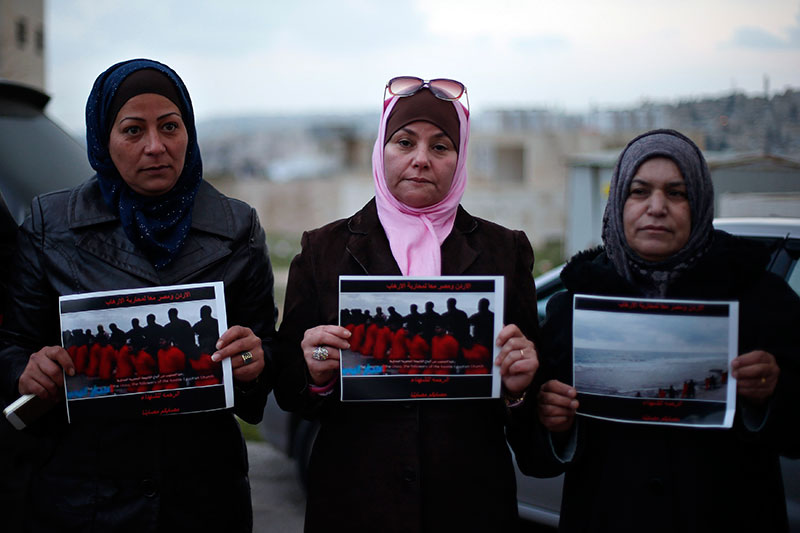
The 21 Egyptian Christians who were beheaded by ISIS militants in Libya will be honored as martyrs and saints by the Coptic Orthodox Church.
According to Thomas D. Williams, Ph.D., of Breitbart, Coptic Orthodox Pope Tawadros II said that the names of the beheaded Christians will be inserted into the Coptic Synaxarium, also known as the church's official list of Martyrs. The procedure is similar to that of canonization in the Latin Church.
"An icon of the 21 martyrs, drawn by Tony Rezk, will be the official image to commemorate their supreme witness," Willams wrote.
Beshir Kamel, 32, said that he was proud of his brothers Bishoy and Samuel, who were two of the victims in the ISIS video, which was released on Feb. 15.
"ISIS gave us more than we asked when they didn't edit out the part where they declared their faith and called upon Jesus Christ. ISIS helped us strengthen our faith," Kamel said.
Kamel added that their martyrdom was "a badge of honor to Christianity." According to Williams, he even thanked the terror group for including "their Christian witness" in the videos before killing them in cold blood.
Williams reported that Kamel made the comments in an interview with SAT 7-ARABIC that went viral. The Coptic Christian was asked what he would do if he saw an ISIS militant, and he recalled his mother's response.
"My mother, an uneducated woman in her sixties, said she would ask [him] to enter her house and ask God to open his eyes because he was the reason her son entered the kingdom of heaven," Kamel said.
Jared Malsin of Time reported that 13 of the slaughtered men came from the Egyptian village of Al-Our, located 150 miles south of Cairo. Kamel told Maslin that he felt at peace, despite the fact that ISIS was causing chaos next door in Libya.
"I felt peace knowing that they died as martyrs in the name of Christ," Kamel said. Of course, the first reaction was sadness at being separated from family."
Malsin reported that Christianity considers a person a martyr if they die because of their faith. Many of the recent martyrs have come from Coptic Christians in Egypt, who make up between 10 and 20 percent of Egypt's population.
"The ISIS victims are depicted next to the throne of Jesus on banners, which are suspended inside and outside the church in Al-Our," Malsin wrote.
As to why the Egyptian Christians went to Libya in the first place, Kamel told Malsin that his brothers were searching for work, which was unavailable in their village. Malsin reported that the average resident in his village earned between the equivalent of $3 and $4 a day.
"It's a hard life," Kamel said. "If you don't work all day, you don't eat at night."
Despite the harsh persecution exercised by ISIS against Coptic Christians and other minority groups, Carol Kuruvilla of the Huffington Post reported that Bishop Angaelos, the leader of the Coptic Orthodox Church in the United Kingdom, indicated that he was willing to forgive the ISIS militants involved in the beheadings.
"We don't forgive the act because the act is heinous. But we do forgive the killers from the depths of our hearts," Angaelos said.
The Coptic leader admitted that it may sound "unbelievable" to some people, but he contended that it was his responsibility as a Christian minister to forgive, according to Kuruvilla.
"Otherwise, we would become consumed by anger and hatred," Angaelos said. "It becomes a spiral of violence that has no place in this world."
According to Kuruvilla, Angaelos expressed hope that U.S. leaders would step up and do more to protect persecuted minorities of all faiths.
"This crime is not just a crime against Coptic Christians," Angaelos said. "It is a crime against humanity, and if there's anything we should stand for as human beings, first and foremost it's the sanctity of all human life."














